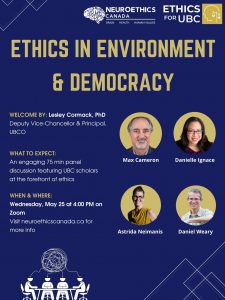 Ethics in Environment & Democracy was the final installation of Ethics for UBC, a five-part speaker series to explore the current landscape of ethics scholarship and education across the Vancouver and Okanagan campuses of our university.
Ethics in Environment & Democracy was the final installation of Ethics for UBC, a five-part speaker series to explore the current landscape of ethics scholarship and education across the Vancouver and Okanagan campuses of our university.
This panel discussion focused on ethics across a variety of disciplines, from animal welfare and ecophysiology, to democracy and ecofeminism.
Date: May 25, 2022
Time: 4:00 PM – 5:15 PM PDT
For more information about the other Ethics for UBC sessions, please visit: https://neuroethics.med.ubc.ca/ethics-for-ubc/.
Welcome by: Lesley Cormack, PhD; Deputy Vice-Chancellor and Principal, University of British Columbia – Okanagan Campus
Moderated by: Viorica Hrincu, MSc; PhD Student, Experimental Medicine; Neuroscience, Engagement, and Smart Tech Lab (NEST), Neuroethics Canada, University of British Columbia
Panelists:
- Maxwell Cameron, PhD; Professor, Department of Political Science and School of Public Policy and Global Affairs, University of British Columbia
- Danielle Ignace, PhD; Assistant Professor, Department of Forest and Conservation Sciences, University of British Columbia
- Astrida Neimanis, PhD; Associate Professor, Department of Community, Culture, and Global Studies, University of British Columbia – Okanagan Campus
- Daniel Weary, PhD; Professor, Faculty of Land and Food Systems, Animal Welfare Program; NSERC Industrial Research Chair in Animal Welfare, University of British Columbia
Break-out Sessions Highlights:
Break-out session with Dr. Max Cameron:
-
-
- Politicians are distinctively enmeshed in the challenge of needing to do good things with inherently problematic tools.
- Elucidating what is ethical and virtuous requires clarifying what we mean when we make appraisals of personal traits or qualities, like “good friend” or “dishonest colleagues”. This could pave the way for objectivity in evaluating ethical traits.
-
Break-out session with Dr. Danielle Ignace:
-
-
- Compared to most universities in the United States, UBC is a leader in hiring and supporting Indigenous scholars and fostering community among those scholars, as well acknowledging that it is situated on First Nations land such as through street signs in the local language.
-
Break-out session with Dr. Astrida Neimanis:
-
-
- Building relationships and conducting meaningful research is driven by the joy and satisfaction that comes with having integrity in ones’ work.
- Bringing stakeholders together to share ideas through unconventional research methods (e.g., poetry, art) can allow for greater understanding of their feelings.
-
Break-out session with Dr. Dan Weary:
-
-
- Advocating for animals who cannot advocate for themselves sometimes means doing so in the face of external pressures and the needs of other affected parties (e.g., economic pressures).
- Better treatment of animals in research is the right thing to do and also produces better science.
- Importance of extending care to those who are unlike and perceived as distant from us.
-
Recommended Resource Materials:
- The FEELed Lab (link)
- Learning to Live with Climate Change, Blanche Verlie (link)
- Pollution Is Colonialism, Max Liboiron (link)
- UBC Animal Research (link)
- Practical Wisdom: The Right Way to Do the Right Thing, Barry Schwartz and Kenneth Sharpe (link)